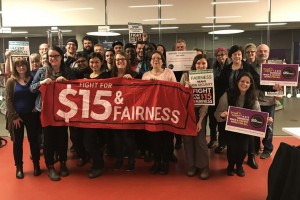You wouldn't think toiling away in the back corridors of some of the continent's most luxurious hotels could be dangerous. But women working at many of those brand-name sleep palaces like Hyatt, Hilton, Starwood and Marriot are facing a high risk of injury, compounded by unnerving slides into precarious work.
As the current recession has deepened, hotels have found more and more innovative ways to squeeze out profits at the expense of workers, many of whom are women. Just ask Brigida Ruiz, a room attendant at the Sheraton Centre Toronto for the past 18 years. She holds in her hand a guest card with an invitation to "Make a green choice." Without doubt, it is one of the most deceptive programs ever foisted on hotel guests wanting to make a difference.
"GREEN" CHOICE MEANS LESS WORK
For a number of years Riuz's hotel, part of the Starwood chain, offered guests the option of not having their linens and towels washed every day in order to save energy. This past fall, Ruiz was informed of the Sheraton's new "environmental" program. It offers guests the option to decline housekeeping services as a way to "conserve natural resources." Guests receive a five-dollar gift card to use at food and beverage outlets in the hotel.
"There's no change in the environmental footprint. This 'choice' program simply gets rid of housekeepers," says Ruiz. "It's had a very big impact. About 70-100 guests hang the notice each night, meaning that six to seven room attendants of lower seniority are not scheduled to report to work the next day. Those that are left are experiencing more injuries. On top of 16 rooms a day, I may have to spend up to an extra hour or more cleaning a room that's been neglected for five days. It's physically brutal and all that dirt is unhealthy."
Along with increased physical stress on those left doing the work, the program is playing havoc with the lives of Ruiz's co-workers because of reduced and uncertain work hours. "The hotel doesn't schedule them for work in anticipation of hotel guests declining service. If more service is needed after the cards are counted overnight, the hotel phones the worker and schedules them to come in for a late morning shift. Who can live with that kind of stress? We're being treated no better than itinerant workers."
MORE INJURIES FOR WOMEN OF COLOUR
While studies as far back as 2003 confirmed that hotel housekeepers report higher injury rates than workers in heavy construction, the issue of physical injuries shot back to prominence late in 2009. A landmark study published in the American Journal of Industrial Medicine not only examined injury rates at leading continental hotel chains; it revealed that risk of injury was higher for women of colour. Conducted by four U.S. universities, the study surveyed workers at 50 hotels including the Starwood, Hilton, Intercontinental, Marriott and Hyatt chains.
"In this study, women hotel workers are 1.5 times more likely to be injured than men and that's consistent with what our membership in Canada has experienced," says Andria Babbington, the health and safety representative for UNITE HERE Local 75, which represents workers at 40 hotels in the greater Toronto area. "Housekeepers are a big part of that statistic and they are primarily immigrants and women of colour. The heavy lifting, bending and scrubbing take its toll on these women in the form of musculoskeletal disorders and acute trauma injuries."
The study also indicated that injury rates varied by employer. "The observed and substantial differences between hotel companies point to a high potential for prevention of these injuries," noted Niklas Krause, a study co-author from the University of California San Francisco.
SEXY CURVE'S A KILLER
The Hyatt hotel chain received the second of two public black eyes in 2009 when the study revealed it had the highest reported injury rate for housekeepers of the hotels surveyed. Last August, three non-union Hyatt hotels in Boston drew condemnation across the United States for abruptly firing 100 housekeepers and replacing them with agency workers, which the housekeepers had unwittingly trained as "vacation" replacements. While UNITE HERE took up the cause of the "Hyatt 100" in demonstrations across the U.S. and Canada, union president John Wilhelm issued a warning shot to Hyatt to: "make changes immediately that will keep housekeepers safe and pain-free at work."
From her vantage point, Althea Porter has insight into Hyatt's injury rate. Porter was a room attendant at the Holiday Inn On King before it was taken over a year ago by the Hyatt Regency Toronto. She cites a number of room changes to meet the "Hyatt standard" that have led to a lot more injuries and complaints among her co-workers since the chain took over."For starters, we're wrestling with the heavier Hyatt luxury mattresses and then wrapping the duvet and forcing it under the mattress with a tuck to give it a 'sexy curve,' as they call it. It's a killer," says Porter, who suffers from carpel tunnel syndrome affecting her arm from shoulder to wrist. "As well, the hotel has installed large standing glass showers with the massaging sprays. How do you clean them? It's all glass; we've never been trained and I'm in there getting my shoes wet throwing water at the glass and scrubbing. There are no safety precautions."
While the amenities are more luxurious, the hotel has not reduced the number of rooms Porter has to clean, even though she's spending 15-30 minutes longer per room than before to meet the Hyatt demands. For Porter, management doesn't get it. "I was told that my colleagues and I are getting injured because of old age. Old age? I'm 40-something. What's worse is that they avoid reporting injuries to workers' compensation because they don't want to trigger an investigation into health and safety problems. If a worker must resort to a doctor's letter that an injury is due to work, the hotel will suddenly find modified work to stop WSIB from being involved. They'll pay for you to come back in a taxi or a wheelchair if they have to!" (The WSIB is Ontario's euphemistically called "Workplace Safety and Insurance Board.")
SQUEEZING PROFITS FROM WORKERS
Injured workers are perhaps the greatest casualties in the hotel chains' efforts to squeeze profits from the bodies of workers. They're buffeted about like pinballs at the whim of hotel owners seeking to avoid their responsibilities under labour codes and human rights laws. Mary Dempster, a former laundry worker at Doubletree International Plaza near Toronto's Pearson Airport, is a case in point.
It's been several years since Dempster's hand was crushed in the hotel's laundry presser machine. Through WSIB, Dempster began retraining as part of the Province of Ontario's Labour Market Re-entry program. "I was going to school for basic English training and other courses but, when the hotel found out that it was going to have to pay for the retraining, it figured that it was cheaper to bring me back on modified duties. They pulled me out of school," says Dempster.
The former laundry worker worked on modified full-time duties for the past two years, until recently. "Now they've cut hours for the four of us on modified duties. If I'm lucky, I get to work one or two days a week, which doesn't pay the bills. The awful thing is that I can't go back to WSIB because it won't take me back. You only get one chance and the hotel ended that opportunity when it pulled me out of the program."
DISRESPECT FOR WORKERS
While employers in Canada have a duty to accommodate injured workers under workers' compensation and human rights laws, a similar pattern played out with Filomena Canedo, a room attendant at Le Meridien King Edward Hotel for 17 years. "After my injury, they said I was an unproductive employee and that there was no modified work position for me," says Canedo, who moved to Canada from the Philippines two decades ago. "It took my union and me 15 months to fight them, during which time I had lost all my benefits. We won and I'm now on permanent modified work. But how many have the resources and stamina to
go through such a lengthy battle to have a job that's rightly theirs? After all, we were injured at their hotels."
Althea Porter concurs. "There's such a disrespect for workers. One of my colleagues fell off a chair while cleaning. She hit her head and was dizzy. All the manager could say was that she should go 'where the old folks go,' to a nursing home. We are working hard to ensure that guests at our hotel receive high quality service. We shouldn't be treated that way when we are injured in the line of duty."
FEWER WORKERS DOING MORE WORK
It's no secret that "labour efficiencies" - getting fewer workers to do more work - have fuelled the profits of many companies, including hotels, for decades. In 1988, hotels employed about 70 workers per 100 rooms. By 2008, that had substantially trimmed to 53 workers per 100 rooms, according to the union. The use of various practices by which "efficiencies" are being found in the hotel sector has increased dramatically during the current recession.
"We used to have three supervisors and now we have one," says the Hyatt's Porter. "Now, I have to inspect my own work. I just pray that in my haste to get all the rooms done I don't miss something, or I'll be reprimanded."
Split shifts, combining jobs, not scheduling sufficient staff, and lack of supervisory staff are all taking their toll on hotel workers.
"In addition to room attendants, you're going to have more injuries when there isn't enough kitchen or wait staff in the food and beverage areas. People are stressed and stretched to the limit to provide good service to guests, and that's when accidents happen," says Babbington.
DESTROYING LIVELIHOODS
"Other practices such as reducing work hours, changing days off, and scheduling on demand are turning good jobs into precarious work," she adds. "When hours drop below certain levels, workers not only lose wages, they lose health benefits and vacation pay. And scheduling them for one day every so often is just downright cruel as that prevents workers from applying for unemployment insurance. All these practices are even harder on non-union workers."
In a recent visit to Canada, one of the Boston "Hyatt 100" former hotel housekeepers had words of warning for hotel workers here. "When Hyatt fired us, we didn't have the protection of a union," said Lucine Williams, a single mother raising a young son with asthma. "The Boston Hyatts started a race to the bottom. The workers replacing us were making about half our wages and had no benefits. This has destroyed our livelihoods, made our families suffer and created a bigger gap between the rich and poor."
THE HIGH ROAD
In 2006, hotel workers went into collective bargaining in Canada and the U.S. Wages and working conditions in hotels in Vancouver, Ottawa and Toronto improved. At that time, UNITE HERE Local 75 asked a task force of hotel industry experts to examine how a better, "high-road" partnership with hotels could build an economy based on skills, innovation and sustainability, avoiding practices that lower living, working and safety standards. That process led to a comprehensive report that contained recommendations including training and equal opportunity initiatives, safe workloads, and balanced lives for the
workers.
"We have those same goals as we head into bargaining in 2010," says Local 75's training coordinator, Janet Dassinger, who coordinated the task force. "There are two roads out of this recession. There's the low road, in which hotels can try to cut labour costs and speed up work, which increases the risk of injuries. Or there's the high road, where the corporations can strengthen the tourism sector by investing in worker training and good safe jobs. That is what Las Vegas has done, and what a recent conference held by the City of Toronto's Economic Development Department has recommended for the entire service sector."
KEEPING HOTEL WORKERS SAFE
While bargaining will be critical, the day-to-day skirmishes to keep hotel workers safe and stop them from being exploited by hotel management will continue, because of union activists like the Sheraton's Brigida Ruiz. "Some of the guests that opted for the fake 'green choice' program have tried to give room attendants the gift card vouchers as a tip," she says. "I wouldn't take them even if they gave me $100, because I know how much work was lost because of this program. Whether you have seniority or not, it's the same. It's a job and we're losing it, so we need to fight for it."
Over at Le Meridien King Edward, Filomena Canedo is keeping a careful watch to see if the Starwood chain plans to introduce the fake "green choice" program in her hotel. "We're not about to allow room attendants to sit at home and injuries to rise, all so that guests think they're doing something good for the environment. We'll continue to expose this sham for what it is." Considering what's going on in the back corridors of the nation's luxury hotels, these women are grace under fire when it comes to doing their jobs.
Hotels & Hurting
Less Work, More Injuries for Women
Valerie Dugale is a Toronto-based writer and communications strategist for labour and non-profit organizations.













